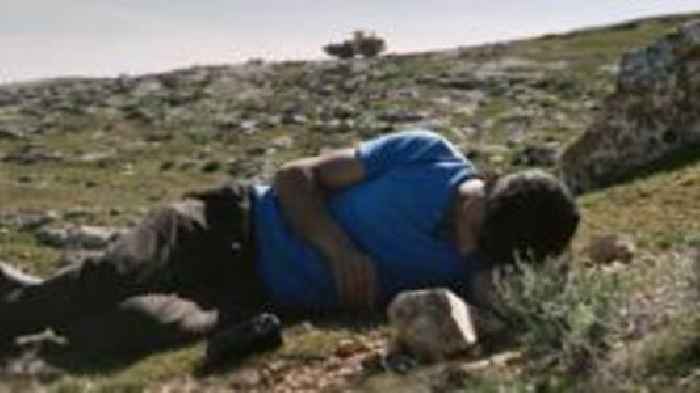The Israeli-Palestinian conflict is one of the most protracted and complex disputes in modern history. Amidst this turmoil, a new documentary, No Other Land, brings personal stories to the forefront, shedding light on the struggles faced by Palestinians in the West Bank and the role of Israeli settlers.
Directed by Basel Adra, Yuval Abraham, Hamdan Ballal, and Rachel Szor, the film has gained international recognition, earning nominations for an Oscar and a BAFTA for Best Documentary Feature.
A Story of Friendship and Struggle
The documentary follows Basel Adra, a Palestinian activist, and Yuval Abraham, an Israeli journalist, as they document the destruction of homes, wells, and schools in Masafer Yatta. For years, they have captured the Israeli army’s demolition of Palestinian structures after court orders deemed the communities illegal.
Their friendship highlights the stark inequality between Palestinians and Israelis, as Basel is restricted from traveling into Israel without a permit, while Yuval moves freely between the territories.
The Conflict Over Masafer Yatta
Masafer Yatta is home to approximately 20 Palestinian villages, which have been at the center of legal battles since the 1980s. Israel declared the area a closed military firing zone, arguing that residents did not live there permanently.
However, Palestinian villagers provided evidence of long-standing habitation, including a 1945 map indicating the presence of their communities. In 2022, Israel’s Supreme Court ruled in favor of the state, permitting the demolition of homes and the displacement of over 1,000 residents.
Scenes from No Other Land capture harrowing moments, including a bulldozer demolishing a primary school, mud being poured into a well, and soldiers confronting villagers. A poignant scene features a mother, forced to live in a cave, reassuring her daughter with the words: “You’re my love… Tomorrow will be a new day.”
Political and Social Repercussions
The film has sparked significant debate, particularly after Yuval Abraham’s speech at the Berlin Film Festival, where he criticized Israel’s policies and called for a ceasefire in Gaza. His remarks drew backlash, with German officials and Israeli media labeling them as antisemitic. Yuval, whose family members perished in the Holocaust, responded by emphasizing the need to combat all forms of dehumanization, regardless of the victim.
Additionally, No Other Land has struggled to find an official distributor in the United States despite its critical acclaim, an unusual situation for an Oscar-nominated documentary.
The Rising Tensions in the West Bank
The film is set against the backdrop of escalating violence in the West Bank. Following Hamas’ attack on Israel on October 7, 2023, which resulted in 1,200 Israeli deaths and 251 hostages, Israel launched a military campaign that has since claimed over 47,500 Palestinian lives in Gaza, according to the Hamas-run health ministry.
Settler-related violence has also surged, with reports indicating that Israeli settlers killed 13 Palestinians since the conflict escalated. The UN documented 1,420 incidents of settler violence in 2024—the highest number recorded since tracking began in 2006.
The Future of Masafer Yatta
In Masafer Yatta, the situation remains dire. Basel Adra continues to report daily harassment by settlers, including attacks on elderly villagers and arbitrary arrests. Despite the film’s global reach, the filmmakers fear that international awareness has not translated into concrete action.
Yuval Abraham acknowledges that while films may not single-handedly change the world, they can influence individuals and contribute to a larger movement for justice. No Other Land serves as a testament to resilience, friendship, and the ongoing struggle for Palestinian rights.
FAQs
1. What is No Other Land about?
No Other Land is a documentary that follows Palestinian activist Basel Adra and Israeli journalist Yuval Abraham as they document the destruction of Palestinian villages in Masafer Yatta.
2. Why was Masafer Yatta declared a military zone?
Israel declared Masafer Yatta a closed military firing zone in the 1980s, arguing that the area was uninhabited. However, Palestinians have provided evidence of long-standing residence dating back generations.
3. What impact has No Other Land had internationally?
The film has received nominations for prestigious awards, including the Oscars and BAFTAs. It has also sparked international debate over Israeli policies in the West Bank.
4. Why has the documentary faced distribution challenges in the US?
Despite its success, No Other Land has struggled to secure a US distributor, which some speculate is due to the film’s sensitive subject matter.
5. What is the current situation in Masafer Yatta?
Settler violence and home demolitions continue in Masafer Yatta, with reports of daily harassment against Palestinian residents.
Conclusion
No Other Land is a powerful documentary that sheds light on the Palestinian struggle in Masafer Yatta while highlighting the complex realities of Israeli-Palestinian relations. The film captures not just the political and legal battles but also the human stories of those affected. While its recognition on the world stage is a step toward awareness, the question remains: Will this awareness lead to meaningful action?

